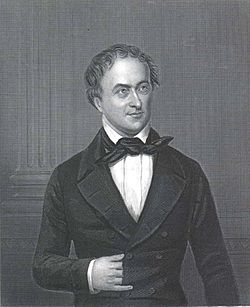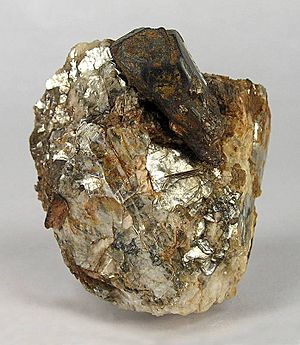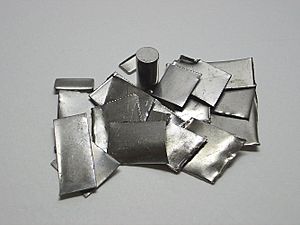Heinrich Rose facts for kids
Quick facts for kids
Heinrich Rose
|
|
|---|---|

Heinrich Rose
|
|
| Born | 6 August 1795 |
| Died | 27 January 1864 (aged 68) Berlin
|
| Nationality | German |
| Known for | rediscovered and naming of niobium |
| Scientific career | |
| Doctoral advisor | Jöns Jakob Berzelius |
Heinrich Rose (born August 6, 1795 – died January 27, 1864) was a German scientist. He studied minerals (a mineralogist) and also worked as an analytical chemist. This means he studied what things are made of.
Heinrich was the brother of another mineralogist named Gustav Rose. Their father, Valentin Rose, was also a well-known scientist.
Heinrich Rose's early work was about phosphorescence. This is when a substance glows without getting hot. Because of his good work, he became a private teacher at the University of Berlin in 1822. Later, in 1832, he became a full professor there.
Contents
Discovering New Elements
Heinrich Rose is most famous for his work with chemical elements. He helped us understand more about two important ones.
The Story of Niobium
In 1846, Rose made a big discovery. He proved that the chemical element niobium was real. He showed it was different from another element called tantalum.
This discovery confirmed something that Charles Hatchett had found earlier. In 1801, Hatchett had discovered a new element in a mineral called columbite. He named it "columbium."
Niobium and tantalum are often found together in this ore. Later, in 1950, the official name for the element became niobium. It was named after Niobe, who was the daughter of Tantalus in Greek mythology.
The Element Pelopium
In 1845, Rose also thought he had found a new element. He called it pelopium. He found it while studying a mineral called tantalite.
However, after more research, scientists realized something. Pelopium was not a new element. It was actually a mix of tantalum and niobium.
Awards and Recognition
Heinrich Rose was a respected scientist in his time. In 1830, he became a foreign member of the Royal Swedish Academy of Sciences. This was a big honor.
Later, in 1860, he was also chosen to be a member of the American Philosophical Society.
Works
- Handbuch der analytischen Chemie (Handbook of Analytical Chemistry). Vol.1&2 . Mittler, Berlin 1833-1834 Digital edition by the University and State Library Düsseldorf
See also
 In Spanish: Heinrich Rose para niños
In Spanish: Heinrich Rose para niños
 | Sharif Bey |
 | Hale Woodruff |
 | Richmond Barthé |
 | Purvis Young |



